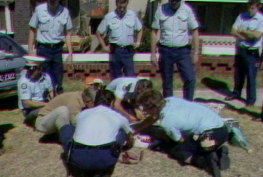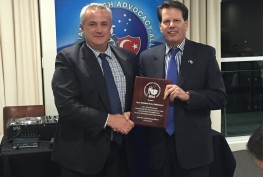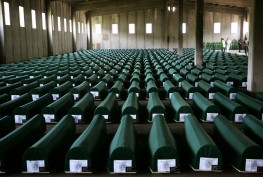ADDRESS BY
HIS EXCELLENCY GENERAL THE HONOURABLE SIR PETER COSGROVE AK MC (RETD)
ON THE OCCASION OF
COMMEMORATION OF THE CENTENARY OF THE BATTLE OF LONE PINE
GALLIPOLI PENINSULAR, TURKEY
7 AUGUST 2015
Australians are ordinary people, with all the frailties and vulnerabilities of our kind. Yet we gather across this commemorative period, 100 years on from World War I to reflect on a remarkable period in modern world history which affected the whole world and not least our nation Australia, in such a dramatic way that we still struggle to understand it. We do know that it called for the most extraordinary efforts from our forbears. Many lie here on Turkish soil.
Here, at Lone Pine, “Bloody Ridge” to the Turks, in this small space and from the great battle that was fought here 100 years ago today, we can gain insights that honour those who fought and died on both sides, here and in other later battles throughout the war. In honouring them we learn about ourselves and continue to grow as a nation.
Anzac Day is indelibly, eternally an honoured part of Australian mythology: a small army of eager and terrified innocents storming ashore against fierce, courageous and determined defenders. 25th April stands on its own. In the months that followed, that atmosphere of eager innocence had vanished. Trench warfare on Gallipoli was horrible – freezing cold weather had turned to crushing heat. Incessant sniping, shellfire and occasional set piece attacks and raids made it a deadly place to be. Hugely unsanitary living conditions made dysentery rife; this and other diseases struck down so many that the forces on both sides were seriously weakened.
On the Allied side, the enduring stalemate and the prospects for success were debilitating of morale from the senior leadership down to the ordinary soldiers in the trenches. No digger would have seen the imminent prospect of death, wounding or serious illness with any sense of glorious duty although all of them would have given just about anything for a decent meal. Our Anzac forebears were tired beyond belief, filthy beyond description, malnourished and possessed of a growing cynicism. And yet they endured, grew closer, gained strength from each other and increasingly from the collective notion of being Anzacs. Armies and indeed communities under such severe stresses can often fragment, dissolve into an “every man for himself” pattern of behaviour. Not the Anzacs.
The great battles of August 1915, here at Lone Pine and elsewhere on the Gallipoli battlefields, were for the senior commanders the ‘last throw of the dice’. They were an all-out push to gain the high ground and beyond to finally control one side of the Dardanelles. After these battles, although it took several more months, withdrawal was the only option left. Perhaps it was this sense of ‘all or nothing’, permeating from the most senior ranks down to the men waiting with fixed bayonets in their trenches just over there but the savagery and intimacy of this four day battle sets it apart in our military history. It was less an example of modern war than a protracted and vicious armed brawl.
Thousands died on both sides as soldiers hunted each other in the dark depths of trenches with bayonet and club and bomb. Survival unscathed was rare, breath-taking courage was commonplace. Seven Australians were awarded the Victoria Cross for their actions within a 24-hour period. Three Australian brigades successively bore the most horrendous casualties in this small piece of ground – thus the men of every State in Australia fought and bled here at Lone Pine. The headstones here tell us that. In our young nation, as men proudly of their state, they left their homes in Toowoomba, Euroa, Cooma, in South Australia, Western Australia and Tasmania to go off to war but here they lie as Australians.
And here is an insight that illuminates what is at the nub of Australia’s role in World War I: on display throughout the Gallipoli campaign but especially here at Lone Pine and the Nek. This quality was abundantly shown throughout the rest of the war in the desert, in France and Flanders: under the most severe conditions of fighting and surviving over those long years, Australians and New Zealanders displayed unbreakable cohesion, they clung to their mates and their leaders as their talismans, their platoons, companies and battalions were their precious military families, always to be cherished and supported and worth dying for. The greater, the graver the threat, the stronger the bond. Later in the war in Europe, several greatly-diminished Australian fighting units refused to obey orders. Not, given the carnage they had endured, to avoid further fighting. Their refusal was to being disbanded, in their view to the breaking up of the family that had struggled together for so long.
It is our nature as Australians to enjoy our freedoms to do what we want, to go where we want, to associate with whom we want. Those men who fought here believed in that enshrined Australian value then as much as we all do now. They also though immediately, intuitively, grasped and held that other enduring value, displayed then, cherished now: to set aside individuality and preference, even to reject an instinct for personal safety and survival. To help each other. These men here would immediately recognize and applaud our Australian communities in the aftermath of tragedies at home and abroad, sleeves rolled up, hearts on display.
They would say “that’s what we believe in, that’s what we’d hoped for.”
We have so many challenges to our peaceful, tolerant and ordered existence in the modern world, in today’s Australia. We are troubled when that prized community cohesion seems to lapse or falter. We look for reassurance, for inspiration, for the strength to make it right.
Look here at Lone Pine and those countless other places around the world where ANZACs lie.
What we seek was in them.
And it is in us still and always.
We thus say to them our benediction – ‘Rest in Peace, Johnnies and Mehmets together’.



